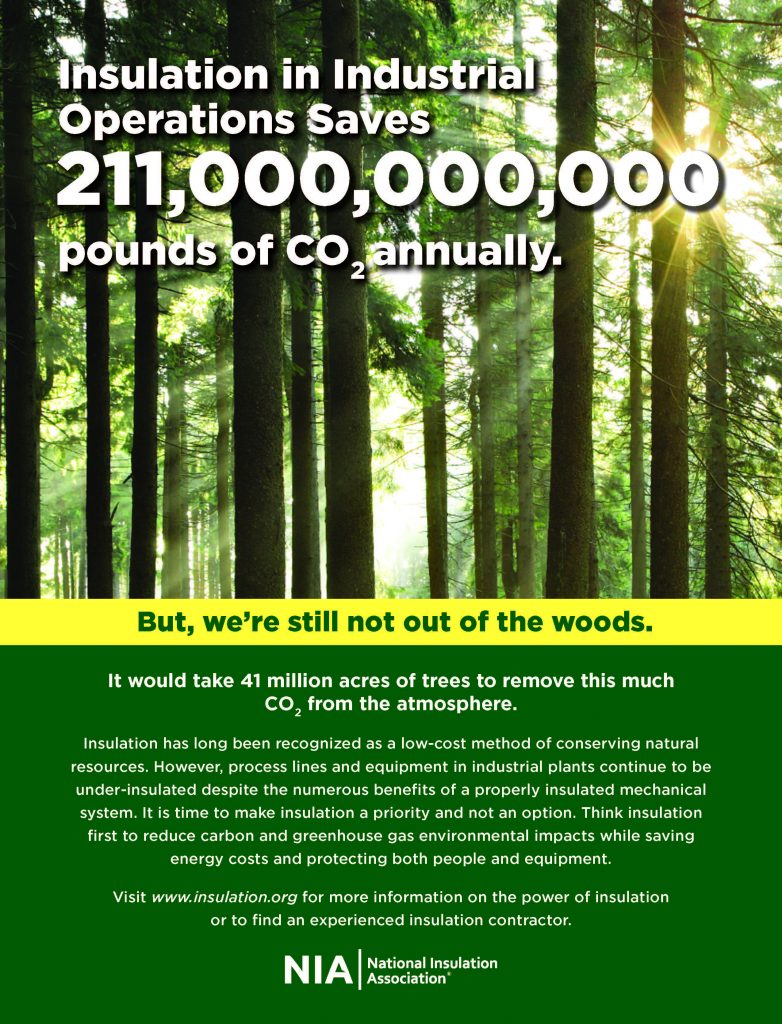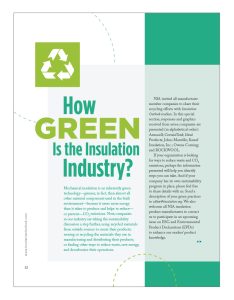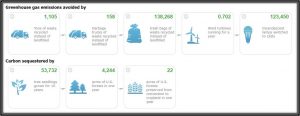Research & Data
A Study on Insulation’s Positive Impact on Energy Efficiency & Emission Reductions
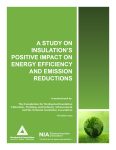 Released in November 2023: The National Insulation Association (NIA) and the Foundation for Mechanical Insulation Education, Training, and Industry Advancement commissioned—for the first time in the history of the mechanical insulation industry—a study to determine the impact mechanical insulation systems can have on reducing the demand for energy and greenhouse gas emissions. This analysis of high-service temperature ranges (150°F–800°F) examines and interprets an 11-year window of information. This webinar includes a comprehensive overview of the study results and an explanation of how these facts can help you and your customers understand the importance of mechanical insulation, and its practical application, in rapidly achieving decarbonization goals for companies, states, and our country.
Released in November 2023: The National Insulation Association (NIA) and the Foundation for Mechanical Insulation Education, Training, and Industry Advancement commissioned—for the first time in the history of the mechanical insulation industry—a study to determine the impact mechanical insulation systems can have on reducing the demand for energy and greenhouse gas emissions. This analysis of high-service temperature ranges (150°F–800°F) examines and interprets an 11-year window of information. This webinar includes a comprehensive overview of the study results and an explanation of how these facts can help you and your customers understand the importance of mechanical insulation, and its practical application, in rapidly achieving decarbonization goals for companies, states, and our country.
For questions about this study or requests for interviews and articles, email research@insulation.org.
- View the results infographic here.
- Read the press release here.
- Read the Executive Summary here.
- Read the article from the November 2023 issue of Insulation Outlook magazine.
- Read the full Energy and Emissions Study here.
- Download the presentation slides from NIA's Fall Summit — To request a presentation of this research, email research@insulation.org.
- Click here to go the Emission Study webinar.
Putting Knowledge into Action: Calculators & Tools
Convert Your Clients' Savings into Real Life Stats
- Send your project's BTU and CO2 data to NIA for a free infographic
- Use the EPA's Emissions Equivalencies Calculator to convert CO2 data to real life examples.
- Use this Calculator for Energy Unit Conversions. Click to Convert BTUs to Therms
Other Tools
- Just starting out? The DOE's Better Buildings' Solutions Resource Hub is an excellent resource for prioritizing energy efficiency and more.
- DOE has developed multiple no-cost low-carbon tools and calculators that aim to help industrial facilities reduce their carbon emissions: Low Carbon Action Plan Tool, a Carbon Inventory Calculator, and an Electrification Impact Calculator. Open-source software can be downloaded at DOE’s Advanced Manufacturing Office Github page.
- DOE’s Financing Navigator allows organizations to evaluate a broad range of financing options for energy-efficiency and renewable-energy projects.
- Manufacturing Energy Assessment Software for Utility Reduction (MEASUR) is a suite of no-cost, open-source software tools that allow industrial energy end users to model facility data, evaluate energy use, and improve industrial energy efficiency. The MEASUR software suite includes more than 70 calculators and assessment tools for a broad range of industrial processes, including pumping systems, process heating, fan systems, steam systems, and compressed air.
Educational Articles
Insulation Outlook Magazine Articles
- 3E Estimator: A New Tool to Help Engineers Cut Building Emissions: A new online tool that can help building engineers dramatically lower building carbon emissions is now available. (November 2024)
- How to Pull 68 Million Metric Tons of CO2 out of the Atmosphere Each Year—Starting Tomorrow: There is no time to waste in reducing carbon emissions. Because the technology already exists, we can—and should—put insulation to work. (July 2024)
- Insulation—Still Greener than Trees: Research and data about energy and carbon emission reductions—see how insulation stacks up against trees and other carbon-reducing technologies. (September/October 2021)
- How Green Is the Insulation Industry? Insulation saves more energy than it takes to produce. From recycled content to sustainable materials to reducing waste, seven companies provide information that will help reduce waste and CO2 emissions, including: Armacell, CertainTeed, Ideal Products, Johns Manville, Knauf Insulation, Owens Corning, and ROCKWOOL Technical Insulation. (October 2022)
- The February 2023 issue of Insulation Outlook focused on Environmental Product Declarations (EPDs) and more:
- Why Contractors Need to Understand Embodied Carbon
- The Benefits of Environmental Product Declarations
- Seeing Clearly the Environmental Benefits of Mechanical Insulation—How to Read an Environmental Product Declaration
- Developing Environmental Product Declarations
- Mechanical Insulation Environmental Product Declarations from Aeroflex USA, Armacell, and Knauf
- Think About Insulation First: Preventing Carbon from Entering the Atmosphere: The most cost-effective way to reduce CO2 is to prevent it from being released into the air in the first place. (August 2022)
- An Earthquake—Let’s Hear it for Mechanical Insulation: What are the tangible carbon-reducing benefits that building owners/designers/builders should consider about mechanical insulation? (July 2022)
- Don't Touch that Light Bulb! See How Insulation Can Be a More Efficient Way to Hit Sustainability Targets: See and quantify how mechanical insulation stacks up against other green technologies. (July 2022)
- A Carbon Message Everyone Should Copy: Case study of how an energy appraisal helped one company target its strategy to meet carbon-reduction goals. (March/April 2022)
- Getting a Green Vocabulary: Sustainability key terms
- ESG and Climate Impact Reporting: Data collection and reporting organizations responsible for the top industry-recognized standards and frameworks in use today.
For more articles, visit the Insulation Outlook archives and search keywords such as carbon, ESG, and efficiency.
Building and Industry Connection (BIC Magazine) Articles
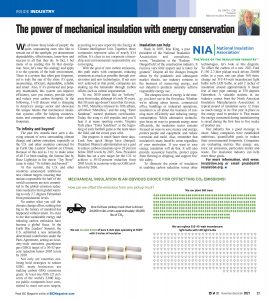
- Mechanical Insulation, Simple Technology (November/December 2025)
- Mechanical Insulation Reduces Energy Consumption and Costs (September/October 2025)
- Inspections Reveal Millions in Energy Loss (July/August 2025)
- Mechanical Insulation is the Real Superhero (May/June 2025)
- Isn’t it Time We Acknowledge How Insulation Truly Works? (March/April 2025)
- Blinded by a Glimpse of the Obvious (January/February 2025)
- Mechanical Insulation: A Good Answer (November/December 2024)
- CO2 Removal: Seek the Forgotten Technology (September/October 2024)
- Mechanical Insulation: The Sustainable Choice (July/August 2024)
- Study Confirms Insulation Reduces Energy Usage, Emissions (May/June 2024)
- It's Only an Increase of 2.7 Degrees (March/April 2024)
- The Superhero Is Mechanical Insulation (Jan/Feb 2024)
- Mechanical Insulation: A Simple Solution with a Big Impact (November/December 2023)
- The Cheapest Form of Energy? The Answer May Surprise You (September/October 2023)
- Dizzying Emissions 2030 to 2050 (July/August 2023)
- Why Wait for a Superhero? MI is coming to the rescue! (May/June 2023)
- Mechanical Insulation: ROI while helping hit emissions goals (March/April 2023)
- Global Warning: Lots of plans — few results (January/February 2023)
- Opportunities in mechanical insulation maintenance and repair (November/December 2022)
- Mechanical Insulation: Preventing Carbon from Entering the Air (September/October 2022)
- Respect for Mechanical Insulation: Point-Source Carbon Capture (July/August 2022)
- Insulation Helps Complete the Circular Economy (May/June 2022)
- Seeing Clearly—Mechanical Insulation's Environmental Benefits (March/April 2022)
- Let's Talk about the Power of Mechanical Insulation (January/February 2022)
- The Power of Mechanical Insulation with Energy Conservation (November/December 2021)
POWER Magazine Article
NIA & DOE Partnership Webinars on Decarbonization Topics
- MEASURing Up: Leveraging the Capabilities of the MEASUR Tool Suite
- Update from GSA on Embodied Carbon (Passcode: $4UBZ87a)
- Hitting the Jackpot with DOE’s Carbon Emissions Reduction Programs
Visit NIA's Webinar page to view all upcoming and archived webinars.
NIA Is a Department of Energy (DOE) Better Climate Challenge Ally
 “We are excited to be an ally and amplify the message about the power of insulation as a thermal technology solution to reduce GHG emissions and increase energy efficiency. NIA has been sharing this message of reducing energy consumption and saving money for decades. As governments, companies, and individuals work to reduce their carbon footprints and reduce GHG emissions, we are eager to share the message that insulation plays an important role in helping achieve their immediate, short-term, and long-term goals. We look forward to working with the DOE and our peers to help create a better planet.”
“We are excited to be an ally and amplify the message about the power of insulation as a thermal technology solution to reduce GHG emissions and increase energy efficiency. NIA has been sharing this message of reducing energy consumption and saving money for decades. As governments, companies, and individuals work to reduce their carbon footprints and reduce GHG emissions, we are eager to share the message that insulation plays an important role in helping achieve their immediate, short-term, and long-term goals. We look forward to working with the DOE and our peers to help create a better planet.”
—NIA EVP/CEO Michele M. Jones
DOE Better Climate Challenge Partners: 3 NIA member companies have taken the pledge. (December 2022, Published in Insulation Outlook magazine)
How Your Organization Can Partner with the U.S. Department of Energy to Reduce Greenhouse Gas Emissions: Programs and resources to help you wherever you are on your decarbonization journey. (July 2022, Published in Insulation Outlook magazine)
The truth about carbon emissions.
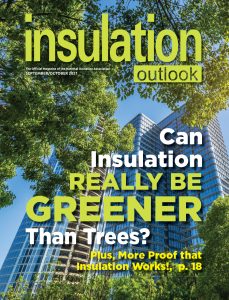 Many people think about light bulbs when they think green. However, it would take 46 light bulbs to equal the CO2 reductions from insulating 1 foot of bare pipe!
Many people think about light bulbs when they think green. However, it would take 46 light bulbs to equal the CO2 reductions from insulating 1 foot of bare pipe!
One foot of insulated pipe = 46 light bulbs, One house = 40 light bulbs (according to EPA) Turning off the power to one house for a year is LESS than the CO2 savings of 1 foot of MI.
Can you see that light bulbs are not the answer. What is the answer? What one technology can help homes, industrial plants, and commercial buildings? MECHANICAL INSULATION
Need more proof? No problem!
From articles to webinars to original research, NIA has gathered resources to help you learn more about the science behind mechanical insulation's effectiveness.
2022: Independent Study Confirms Insulation Upgrades are Keys to Significant Energy Savings and Emission Reductions in Existing Buildings
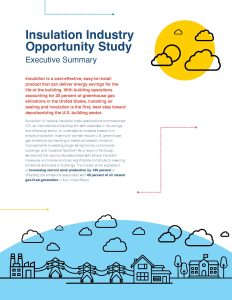 A coalition of trade associations, including the North American Insulation Manufacturers Association, the Insulation Contractors Association of America, the National Insulation Association, the American Chemistry Council (Plastics Division) and the Polyisocyanurate Insulation Manufacturers Association, commissioned a study that quantifies the benefits of completing insulation retrofit projects across residential, commercial and industrial buildings and underlines the potential impact forward-thinking policies can have on decarbonizing the built environment.
A coalition of trade associations, including the North American Insulation Manufacturers Association, the Insulation Contractors Association of America, the National Insulation Association, the American Chemistry Council (Plastics Division) and the Polyisocyanurate Insulation Manufacturers Association, commissioned a study that quantifies the benefits of completing insulation retrofit projects across residential, commercial and industrial buildings and underlines the potential impact forward-thinking policies can have on decarbonizing the built environment.
- Read the press release here.
- Read the Executive Summary here.
- Read the Insulation Industry Opportunity Study here.
- Watch a free webinar here on the study. (registration required)
A Podcast You Don't Want to Miss
 NIA Executive Vice President/CEO Michele M. Jones sat down with The Freeman Report Podcast Host and NIA Past President Kenny Freeman for a wide-ranging discussion on the important role that mechanical insulation can and should play in the decarbonization discussion.
NIA Executive Vice President/CEO Michele M. Jones sat down with The Freeman Report Podcast Host and NIA Past President Kenny Freeman for a wide-ranging discussion on the important role that mechanical insulation can and should play in the decarbonization discussion.
Moving mechanical insulation out of the shadows and into the spotlight, this podcast will help listeners understand that mechanical insulation is on a whole other level from what they may be familiar with in their home’s attic and walls and can play a significant role in reducing greenhouse gases and moving us toward decarbonization goals. Listen to The Freeman Report here.
